

A Foreign Policy for All. Around the world, democracy is under assault.

Authoritarian governments are gaining power, and right-wing demagogues are gaining strength. Movements toward openness and pluralism have stalled. Inequality is growing, transforming rule by the people into rule by wealthy elites. And here in the United States, many Americans seem to accept—even embrace—the politics of division and resentment. How did we get here? The impact of these policy changes has been devastating. Stay informed In-depth analysis delivered weekly Thank you for signing up.Stay tuned for the latest from Foreign Affairs. To fight back, we need to pursue international economic policies that benefit all Americans, not merely an elite few. The urgency of the moment cannot be overstated.
The globalization of trade has been tremendously profitable for the largest American corporations. But U.S. trade and economic policies have not delivered for the middle class. And what has this brought us? President John F. National Museum of the American Indian. Native Americans. Variable Stars Have Strange Nonchaotic Attractors. What struck John Learned about the blinking of KIC 5520878, a bluish-white star 16,000 light-years away, was how artificial it seemed.
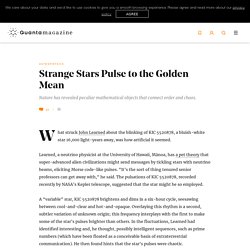
Learned, a neutrino physicist at the University of Hawaii, Mānoa, has a pet theory that super-advanced alien civilizations might send messages by tickling stars with neutrino beams, eliciting Morse code-like pulses. Letting slower passengers board airplane first really is faster, study finds. Commercial airlines often prioritize boarding for passengers traveling with small children, or for those who need extra assistance—in other words, those likely to be slower to stow their bags and take their seats—before starting to board the faster passengers.

It's counter-intuitive, but it turns out that letting slower passengers board first actually results in a more efficient process and less time before takeoff, according to a new paper in Physical Review E. Physicists have been puzzling over this particular optimization problem for several years now. Lorentzian-geometry-based analysis of airplane boarding policies highlights ``slow passengers first'' as better 2019. Boston's EMPath Program Uses Science to Fight Family Poverty. “The Family Carpool Lane Tool,” meanwhile, helps parents and their children align individual and family goals.
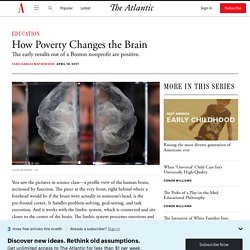
Working together, they can avoid traffic and cruise through the fast lane. Intergen mentors visit participating families and facilitate conversations that prompt both adults and children to make future-oriented and contextualized decisions, ones that take into account other important domains. Their goal is to help the adults in the families become mentors for themselves and their children. Eventually, they hope, they make their own contributions obsolete. The 10 Vital Skills You Will Need For The Future Of Work. Since we’re in the midst of the transformative impact of the Fourth Industrial Revolution, the time is now to start preparing for the future of work.
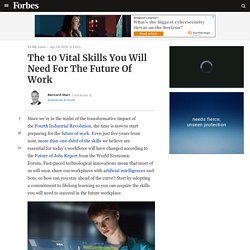
Even just five years from now, more than one-third of the skills we believe are essential for today's workforce will have changed according to the Future of Jobs Report from the World Economic Forum. Fast-paced technological innovations mean that most of us will soon share our workplaces with artificial intelligences and bots, so how can you stay ahead of the curve? Start by adopting a commitment to lifelong learning so you can acquire the skills you will need to succeed in the future workplace. 10 Skills You Need for the Future of Work Creativity. Ten reasons why a 'Greater Depression' for the 2020s is inevitable. After the 2007-09 financial crisis, the imbalances and risks pervading the global economy were exacerbated by policy mistakes.
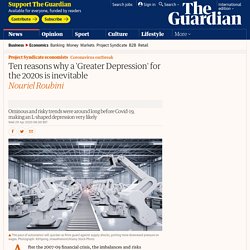
So, rather than address the structural problems that the financial collapse and ensuing recession revealed, governments mostly kicked the can down the road, creating major downside risks that made another crisis inevitable. And now that it has arrived, the risks are growing even more acute. Unfortunately, even if the Greater Recession leads to a lacklustre U-shaped recovery this year, an L-shaped “Greater Depression” will follow later in this decade, owing to 10 ominous and risky trends.
Prejudices and Antipathies. 33 Myths Of The System : Darren Allen : Free Download, Borrow, and Streaming. Why 56 black men are posing in hoodies. Cephas Williams is tired of how people look at him when he wears his hoodie.

"I am a black man with a degree in architecture, and I find I am not taken seriously when I walk into a room full of strangers. " Cephas is now trying to change perceptions of black men through the use of photography. The 27-year-old is an entrepreneur from New Cross, south-east London, who works in the community. How much does your country invest in R&D? Global spending on R&D has reached a record high of almost US$ 1.7 trillion.
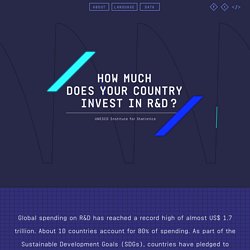
About 10 countries account for 80% of spending. As part of the Sustainable Development Goals (SDGs), countries have pledged to substantially increase public and private R&D spending as well as the number of researchers by 2030. Explore the latest available data from the UNESCO Institute for Statistics (UIS), which is monitoring progress globally towards this key SDG target. To evaluate a country’s commitment to R&D, look at spending as a percentage of GDP. The Atlas of Economic Complexity. Countries Ranked by Their Economic Complexity. In the past, the trade between nations was a much simpler matter to grasp.
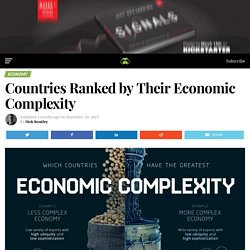
Commodities and a few finished goods moved between a handful of countries in a straightforward way. Today, around 6,000 officially classified products pass through the world’s ports, and digital products and services zip across country lines creating an extra layer of difficulty in measuring economic activity. To try to understand this enormous level of economic complexity, the team at Harvard’s Growth Lab have created the Country Complexity Ranking. Future Work/Technology 2050 – The Millennium Project. Report on a three-year international study that produced three detailed scenarios, conducted 30 national workshops in 29 countries, identified hundreds of action distilled to 93 that were assessed by hundreds of futurists and related experts in over 50 countries.
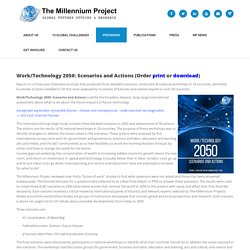
Work/Technology 2050: Scenarios and Actionscould be the broadest, deepest, long-range international assessment about what to do about the future impacts of future technology. A pragmatic exploration of possible futures – choices and consequences – really exercised my imagination.— Vint Cerf, Internet Pioneer This international long‑range study includes three detailed scenarios to 2050 and assessments of 93 actions. The actions are the results of 30 national workshops in 20 countries. Who will live and work in the EU in 2060? What can we know about the EU’s population and workforce in 2060? While fortune telling is fraught with risk, demographic trends offer a glimpse into the future in a new report by the Commission’s Joint Research Centre. Today, the Joint Research Centre and the International Institute for Applied Systems Analysis launch a joint report on the future demographics of the EU.
By looking at factors such as migration, education levels and labour force participation, the report moves beyond traditional demographic analysis to provide a set of scenarios which reveal how these factors can shape the EU’s future population and labour market. Key findings. What’s Really Behind the Fall in China’s GDP? – Brink – The Edge of Risk. A person walks down the street of the financial district of Lujiazui in Shanghai. China’s GDP growth in the second quarter of 2019 slowed to 6.2%, the smallest gain since 1992. Photo: Hector Retamal/AFP/Getty Images China’s GDP growth in the second quarter of 2019 slowed to 6.2%, the smallest gain since 1992. How much of this is due to the current U.S. -China trade conflict, and how much of it is being caused by longer-term issues in China itself? Tom Carver, BRINK’s editor, spoke with Professor Richard Dasher, director of the U.S. Grappling. Roomabout. Ruminie. ): Will Not Open ):
Roundabout. Colonialism - Post-Colonialism. Economics.